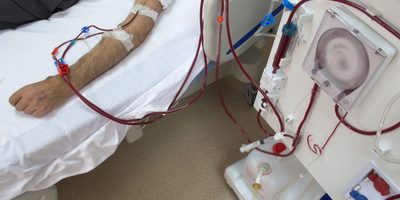
$5 million for Kidney Disease Clinical Trials
The George Institute has been awarded more than $5 million from the Medical Research Future Fund (MRFF) to fund two new clinical trials.
The funds were awarded under the Rare Cancers, Rare Diseases and Unmet Need Clinical Trials program that addresses areas of health burden and unmet needs.
Associate Professor Martin Gallagher will work with a global team investigating a new treatment to improve survival rates for people undergoing dialysis.
Cardiovascular disease, particularly heart failure, is the leading cause of death in dialysis patients. In the general population, the use of mineralocorticoid antagonists, such as spironolactone, that help the body get rid of excess salt and water, have been shown to reduce mortality and hospital admissions. However, this standard therapy is rarely used in patients with end-stage kidney disease as there remain concerns about the safety and effectiveness of the treatment.
The ACHIEVE study has been awarded $2,850,988.40 and will examine the effect of spironolactone (a mineralocorticoid antagonist) compared to placebo in outcomes of cardiovascular death and heart failure in dialysis patients. This is an international collaboration with the Population Health Research Institute (based in Canada) that will recruit approximately 2,750 participants across North America, Europe, UK, and the Asia Pacific Region.
Associate Professor Meg Jardine also received $2,201,943.70 to lead a trial into the rare disease calciphylaxis, which affects up to 4% of people on dialysis. Calciphylaxis is a devastating condition that causes painful skin ulcers and serious infections. Currently the prognosis is poor with no proven methods for treating calciphylaxis and an average survival rate of just three months.
BEAT-Calci is a new innovative trial that will allow multiple promising therapies to be tested and quickly introduced into practice. The trial was developed in collaboration with the Australasian Kidney Trials Network as part of the BEAT-CKD initiative. It has developed into a global initiative, comprising world-recognised experts from Australia, the USA, the UK, Germany and New Zealand.
Professor Vlado Perkovic, Executive Director of The George Institute, said clinical trials such as these would save lives and bring hope to people with end-stage kidney disease. Professor Perkovic said: “Outcomes for people on dialysis are poor with death rates worse than many common cancers. We urgently need new therapies and these funds from the Medical Research Future Fund will help us achieve that goal.”
In total, $38.6 million was handed out from the MRFF to support 23 new clinical trials to improve treatments and discover cures for debilitating and deadly rare cancers and rare diseases, including: $10.8 million for rare cancer clinical trials, $18.3 million for rare diseases clinical trials, $6.6 million for unmet needs clinical trials, and $4.5 million for brain cancer clinical trials.
The $20-billion MRFF was established in 2015 to provide a sustainable source of funding for vital medical research.
Last year, three George Institute staff were awarded fellowships from the MRFF: Professor Bala Venkatesh, Associate Professor Meg Jardine and Dr Sradha Kotwal.





